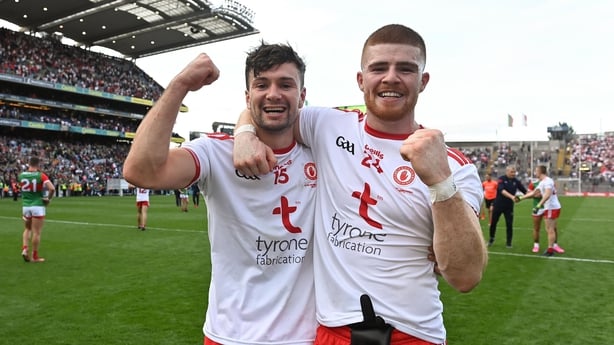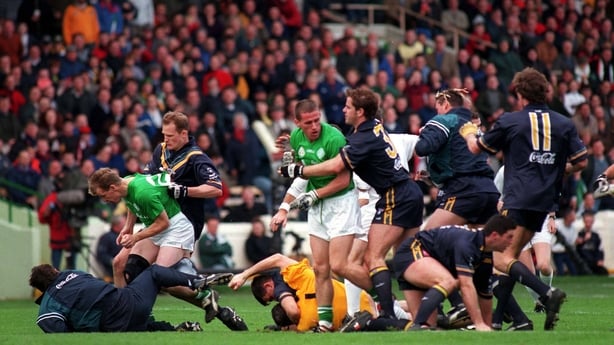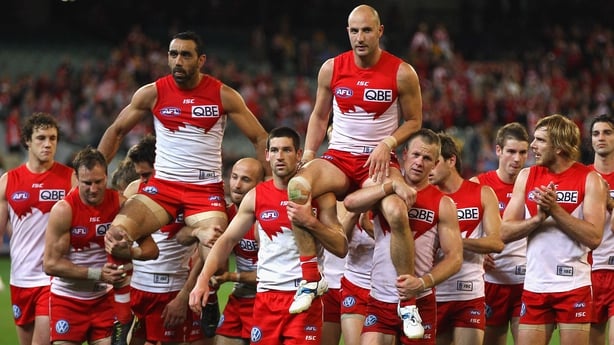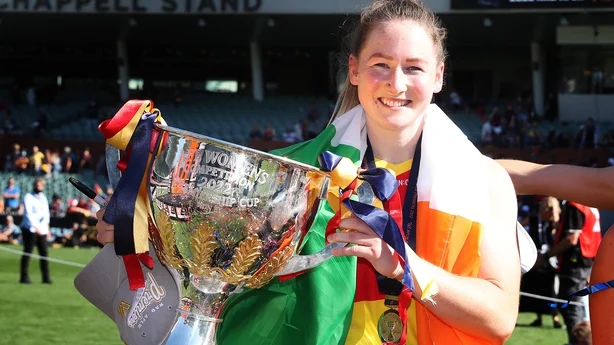In the small hours of Saturday morning, Conor McKenna has a chance to join Tadhg Kennelly as the second man to add an AFL Premiership title to an All-Ireland medal.
McKenna's Brisbane Lions reached the Grand Final for the second year running after narrowly defeating Geelong in last weekend's preliminary final.
The 28-year old has spent the bulk of his footballing career in Australia first during a six-year stint with Essendon which concluded in the midst of the Covid lockdown in 2020. He returned to Australia before the 2023 season, signing for the Lions.
Sandwiched in between, he managed to snatch an unlikely All-Ireland medal, Tyrone capitalising on Dublin's mysterious off-year to win 2021's straight knockout championship. McKenna was prominent enough in the success, slipping home two goals as they caught Kerry on the hop in the semi-final. In the final, he laid on the killer second goal for Darren McCurry with a stylish no-look fist pass across goal.
Tyrone's title defence was limp, and McKenna was one of two players sent off in the chastening Ulster SFC defeat to Derry. Soon enough, he'd be gone back Down Under.

He's made 17 appearances for Brisbane in the run to the final in 2024, with an inventive little pass to create a goal in last weekend's victory being circulated in the Irish corner of social media.
It's nearly 60 years since the earliest interactions between Aussie Rules and Gaelic football, when "colourful" Australian sports promoter and media mogul Harry Beitzel brought a crack team of VFL (Victorian Football League, as it was then) stars to play the slightly worse for wear All-Ireland champions Meath in Croke Park in the autumn of 1967.
The game in question was basically Gaelic football - minus the pick-up - and it proved a humbling experience for the hosts.
The newly-minted All-Ireland champions were smashed 3-16 to 1-10. Meath full-back Jack Quinn protested to this writer some years ago that it was a deadly mixture of complacency concerning the Aussies capability with the round ball and a strict post-All-Ireland regimen of heavy pint drinking which had left them vulnerable to such a humiliation.
The Irish Times Paddy Downey wrote of the "bronzed Aussie giants in their sleeveless jerseys looking like a line-up for a Mr. Universe contest. Meath were mere Lilliputians compared to the muscular Gullivers of the Antipodes."
Meath's honour was restored the following year, when they were invited down to Australia and won five matches from five against Perth, Sydney, Melbourne, Adelaide and then an all-Australian selection.
That was the height of it until the early 1980s, when the so-called 'Irish experiment' was embarked upon on the initiative of then Melbourne Demons coach Ron Barassi.
The Scottish-born Kerry minor Sean Wight was the first recruit, going on to enjoy a successful career with the Melbourne club.
A couple of years later, they struck gold with probably the most famous of all the Irish recruits, Jim Stynes becoming a folk hero in his adopted home, winning the Brownlow Medal (Player of the Year) in 1991 and a couple of All-Star equivalents in 1991 and 1993.
While Stynes and Wight prospered, the majority of recruits struggled and typically returned home having made minimal impact.
Jim's brother Brian played only a handful of games before returning home, as did Roscommon's Paul Earley and Derry's Dermot McNicholl. Anthony Tohill and Niall Buckley went out but didn't play a single AFL game.
Colin Corkery recounted his own baptism of fire during pre-season with Carlton, outlining how, after drifting off the back of the pack during the squad's 10k runs around Melbourne, he used to catch up by hopping on the city tram.
While not all the Gaelic football converts suffered that acutely, by the 1990s, the Irish experiment was badly out of fashion and more or less abandoned by most clubs.
The compromised rules series, which had run biennially between 1984 and 1990, was also let lapse due to increasing public apathy and amid much hand-wringing over on-field violence.
It was the resurrection of the international series in the late 90s which probably re-ignited the 'Irish experiment' within Australian rules. The GAA and AFL hammered out an agreement to reinstate the series in 1998, with the latter giving the tours their official imprimatur this time around.

The Irish Independent noted at the time that the AFL could qualify for Australian government funding reserved for sports with an international dimension, a factor which may have helped drive their sudden enthusiasm.
Despite losing the first test by a point, Ireland won the two-game series for the first time on home soil, the only real controversy centring around the hosts' rather tattered looking jerseys in the opening test, which was compared unfavourably with the Aussies pristine gear.
But it was the tour from the Australian U17 schools team six months earlier, in April '98, which made the biggest impact long-term.
The tourists played in Croke Park against an Irish U17 selection containing star Kerry minor Tadhg Kennelly, from the Listowel footballing dynasty.
Several Australian clubs expressed an interest after that, with Kennelly signing a two-year deal with Sydney Swans in September 1999.
The Kerryman was the most successful recruit among the second wave of the Irish experiment in the 2000s, making almost 200 appearances for Sydney, itself an upstart entity in a league traditionally centred around Melbourne.
Kennelly would go one better than Stynes - whose only Grand Final appearance early in his career in 1988 ended in defeat - by becoming the first Irish player to win an AFL Premiership title in 2005.

Kennelly scored a goal in the decider against West Coast Eagles and did a Riverdance jig on the podium afterwards when collecting his medal.
Four years later, he would do the same from the Hogan Stand, after returning to help Kerry win their fifth All-Ireland title of the decade. McKenna now has the chance to emulate Kennelly's feat of winning the biggest prize in AFL and Gaelic football at the weekend.
Interestingly, there are some parrallels between Kennelly's victory with Kerry in 2009 and McKenna's win with Tyrone in 2021. Neither were much-fancied mid-campaign.
Kerry, notwithstanding their glut of successes in the 2000s, were thought to be in rag order after a heavy Munster defeat to Cork and shockingly narrow qualifier wins over Longford and Sligo. Then came their sudden revival in the 'startled earwigs' quarter-final and they were back on track. Kennelly, lucky to play beyond the first few seconds in the final after elbowing Nicholas Murphy at the throw-in, curled over two points as they quelled Cork to win the title.
The Listowel man was a little too candid about the Murphy incident in his subsequent autobiography, blaming a mix-up with the ghostwriter. While he initially intended to be around for Kerry's All-Ireland defence, he ultimately returned to Australia for 2010.
And Tyrone were on the brink of forfeiting their place in the All-Ireland series altogether in 2021 after an outbreak of Covid following the Ulster final. Their daring game of brinkmanship surrounding the scheduling of the semi-final prompted Kerry to agree to a postponement - and we know the rest.
There's been a steady stream of Irish players travelling down under in the years since the turn of the century, occasionally prompting a bout of understandable panic among the Gaelic football custodians back home that their county teams were being ransacked.
Mayo's Pearce Hanley made in excess of 160 appearances for Brisbane and latterly the West Coast Eagles. Setanta Ó hAilpín and Marty Clarke both made upwards of 70 appearances in the league, for Carlton and Collingwood respectively.
Latterly, there has been the development of the women's code - the AFLW - in 2017, which has witnessed a stampede of Gaelic footballers travelling down, partly encouraged by the fact that the season didn't overlap with the inter-county season back home.
Cora Staunton, already a legend in her homeland, would establish herself as an all-time great in a second code in late 30s, becoming one of the league's all-time top scorers.

Among the throngs of Irish players who've filled rosters in the AFLW since its inception, four have won Premiership titles - Ailish Considine (Adelaide 2019, 2022), Orla O'Dwyer (Brisbane 2021), Sinead Goldrick and Blaithin Mackin (both Melbourne 2022)
On the male side, Laois's Zach Touhy - who retired this month - would emerge as the strongest Irish AFL star of the 2010s and possibly the greatest ever, eventually surpassing Jim Stynes record appearance tally in 2023. The year before, Touhy and Kerry's Mark O'Connor would help Geelong to the 2022 Premiership title, becoming the second and third Irish players to claim the crown.
McKenna can join this select group this weekend, his Brisbane side taking on the Sydney Swans, another upstart franchise from rugby league territory, for whom his Irish forerunner Kennelly made such an impact two decades ago.
Disclaimer: The copyright of this article belongs to the original author. Reposting this article is solely for the purpose of information dissemination and does not constitute any investment advice. If there is any infringement, please contact us immediately. We will make corrections or deletions as necessary. Thank you.






